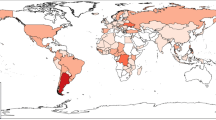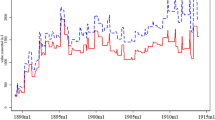Abstract
We characterize optimal debt policy in a dynamic stochastic general equilibrium model of defaults and devaluations in which self-fulfilling crises can arise. When the government cannot commit to repay its debt and cannot commit to maintain the exchange rate, consumers’ expectations of devaluation make the safe level of government debt very low. We show that, when the debt is in the crises zone—where self-fulfilling crisis can occur—the government finds it optimal to reduce the debt to exit the zone. The lower the probability that consumers assign to devaluation, however, the greater is the number of periods that the government will choose to take to exit the crisis zone. We argue that our model can help understand events in Argentina in 2001–2002 and throw light on some aspects of the current EMU sovereign debt crisis.
Similar content being viewed by others
References
Antinolfi G., Huybens E.: Domestic financial market frictions, unrestricted international capital flows, and crises in small open economies. Econ. Theory 24(4), 811–837 (2004)
Calvo, G.A., Izquierdo, A., Talvi, E.: Sudden Stops, the Real Exchange Rate, and Fiscal Sustainability: Argentina’s Lessons. NNBER Working Paper 9828 (2003)
Cole H.L., Kehoe T.J.: A self-fullfilling model of Mexico’s 1994–95 debt crisis. J. Int. Econ. 41, 309–330 (1996)
Cole H.L., Kehoe T.J.: Self-fullfilling debt crisis. Rev. Econ. Stud. 67, 91–116 (2000)
De la Torre, A., Levy Yeyati, E., Schmukler, S.L.: Living and Dying with Hard Pegs : The Rise and Fall of Argentina’s Currency Board. World Bank Policy Research Working Paper 2980 (2003)
Garcia Pires, A.J.: International trade and competitiveness. Econ. Theory (2010). doi:10.1007/s00199-010-0586-2
Kehoe T.J., Ruhl K.J.: Sudden stops, sectoral reallocations, and the real exchange rate. J. Dev. Econ. 89, 235–249 (2009)
Krasa S., Sharma T., Villamil A.P.: Bankruptcy and firm finance. Econ. Theory 36(2), 239–266 (2008)
Krugman P.R.: A model of balance-of-payments crises. J. Money Credit Bank. 11, 311–325 (1979)
Krugman P.R.: Are Currency Crises Self-Fulfilling?. In: Bernanke, B.S., Rotemberg, J.J. (eds) NBER Macroeconomics annual, pp. 345–378. MIT Press, Cambridge (1996)
Kydland F.E., Zarazaga C.E.J.: Argentina’s lost decade. Rev. Econ. Dyn. 5, 152–165 (2002)
Obstfeld M.: Rational and self-fulfilling balance-of-payments crises. Am. Econ. Rev. 76, 72–81 (1986)
Obstfeld M.: Models of currency crises with self-fulfilling features. Eur. Econ. Rev. 40, 1037–1047 (1996)
Pastine I.: Devaluation of fixed exchange rates: optimal strategy in the presence of speculation. Econ. Theory 15(3), 631–661 (2000)
Perry, G., Serven, L.: The Anatomy of a Multiple Crisis : Why was Argentina Special and What Can We Learn from it? World Bank Policy Research Working Paper 3081 (2003)
Reis, C.: Taxation without commitment. Econ. Theory (2011). doi:10.1007/s00199-011-0656-0
Sachs J., Tornell A., Velasco A.: The Mexican peso crisis: sudden death or death foretold?. J. Int. Econ. 41, 265–283 (1996)
Schmitt-Grohe S., Uribe M.: Closing small open economy models. J. Int. Econ. 61, 163–185 (2003)
Yu, Z.: Openness, managerial incentives, and heterogeneous firms. Econ. Theory (2010). doi:10.1007/s00199-010-0595-1
Author information
Authors and Affiliations
Corresponding author
Additional information
This article has benefited from comments and suggestions of the Editor, Timothy J. Kehoe, and two anonymous referees. We are especially grateful to Juan Carlos Conesa and seminar participants at the Workshop on Dynamic Macroeconomics held at University of Vigo. The first draft of the article was written while Jose Maria Da-Rocha was visiting the ITAM. He gratefully acknowledges the hospitality of ITAM.
We gratefully acknowledges financial aid from the Spanish Ministry of Science and Innovation (ECO2009-14697-C02-02 and ECO2010-17943) and Consellería de Innovación e Industria, Xunta de Galicia (10PXIB100189PR).
Rights and permissions
About this article
Cite this article
Da-Rocha, JM., Giménez, EL. & Lores, FX. Self-fulfilling crises with default and devaluation. Econ Theory 53, 499–535 (2013). https://doi.org/10.1007/s00199-012-0702-6
Received:
Accepted:
Published:
Issue Date:
DOI: https://doi.org/10.1007/s00199-012-0702-6




